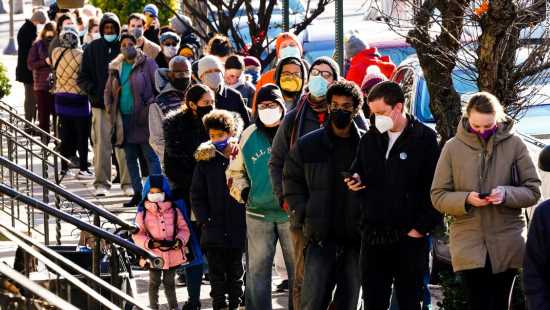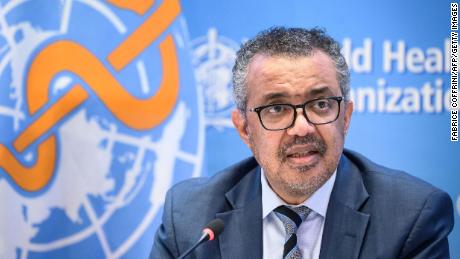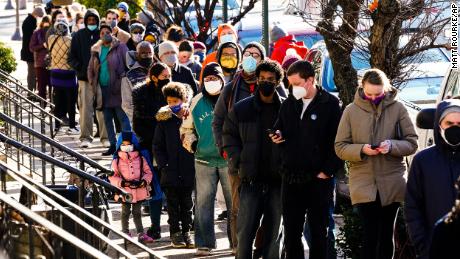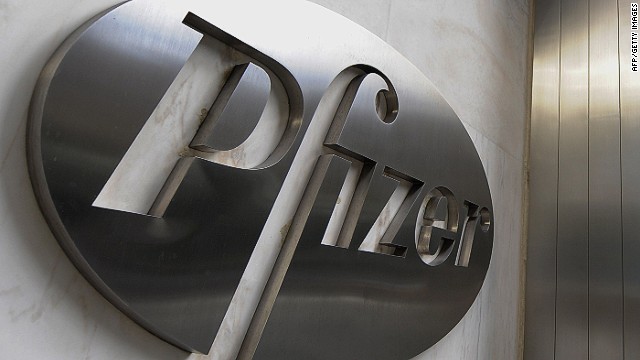(CNN)The impact of the Omicron coronavirus variant on a largely unboosted US population going into the holiday season will create a “perfect storm” that will challenge health care systems from coast to coast, an expert said Monday.
Omicron is now the country’s most dominant strain less than three weeks after the first case was reported in the US. It accounted for more than 73% of new coronavirus cases in the week ending Saturday, the US Centers for Disease Control and Prevention estimated Monday.
“Even though more people who get it have milder illness, so many more people, overall, will get it that I think we are going to see a real challenge in our health care systems over the course of the next three to eight weeks,” said Michael Osterholm, director of the Center for Infectious Disease Research and Policy at the University of Minnesota.
“And what really is challenging is, on top of that, we can expect 10% to 30% of health care workers to get infected during that time.”
The variant will not discriminate by state lines, Osterholm told CNN on Monday.
“Instead of seeing the regional surges we were seeing with Delta — much of the West right now is very low level with Delta, parts of the South — I think Omicron is going to be a national viral blizzard,” he said.
The first confirmed Omicron-related death in the US was reported Monday. The Texas man in his 50s was unvaccinated, had underlying health conditions and previously had been infected with Covid-19, officials said.
Globally, Omicron cases are doubling every 1.5 to 3 days, the World Health Organization said.
Omicron’s far higher transmission levels compared to Delta would lead to a rise in US hospitalizations, Osterholm said.
Nearly 73% of Americans have received at least one vaccine dose, while 61.5% are fully vaccinated and 29.8% of those fully vaccinated have received a booster, according to CDC figures.
People should focus on getting optimal protection from the virus with a booster, Osterholm said.
“Right now, we have a lot of people in this country who have bought some protection, but will it be enough to actually avoid serious illness with Omicron? We don’t know.”
It’s concerning that just 30% of vaccinated Americans had received a booster, as it takes seven to 14 days for immunity to really pick up following a booster shot, Osterholm said.
“Well, that takes us into the New Year. Takes us right through the holiday season and right into the heart of the Omicron, what I call, ‘blizzard.’ So, it’s not looking good. It’s a real perfect storm, unfortunately, of events,” he said.
President Joe Biden on Tuesday is expected to announce additional steps in the fight against Covid-19, the White House said, but he won’t necessarily talk about more restrictions in the face of rising cases.
Biden will announce the purchase of a half-billion at-home rapid Covid-19 tests and a plan to distribute them free to Americans who request them through a website, an administration official said.
The 500 million new tests will be made available next month and will reach Americans through the mail, the official said.
How often and when people need to test for Covid-19 depends on their situation, Dr. Anthony Fauci said Tuesday.
“If you are going to be going to a function, a dinner, and you’re vaccinated, hopefully, and boosted, but you want to go the extra step … you should do that,” Fauci, director of the National Institute of Allergy and Infectious Diseases, told CNN’s “New Day.”
“Also, if you’re in a situation where you may have been exposed to someone, you might want to get tested a few days later to make sure that you’re in a situation when you have not been infected,” Fauci said.
Also among the President’s new initiatives is a plan to prepare 1,000 military service members to deploy to overburdened hospitals across the country in January and February, administration officials said. Those service members will include doctors, nurses, medics and other military medical personnel.
Daily Covid-19 case numbers with Omicron could exceed previous peaks, CDC warns
Omicron cases could cause higher case rates than the US has seen with previous peaks, the CDC posted on its website this week.
Previously, cases peaked at their highest level in January 2021, with 7-day averages exceeding 250,000 new cases per day.
The US is currently averaging more than 139,700 new Covid-19 cases each day, according to Johns Hopkins University. This is 16% higher than a week ago, and back to levels last seen in mid-September.
Experts say this doesn’t mean hospitalizations and deaths will rise at the same level we’ve seen with earlier surges, in part because the country has higher levels of immunity to Covid-19 and also because early data suggest Omicron may causes less severe disease.
Still, Omicron cases could lead to “surges of hospital demand even if severity is reduced, because of the large number of anticipated cases occurring in a short period of time,” the CDC notes.
States prepare for Omicron
Some states are already overwhelmed, with Army medical personnel deploying to help fight Covid-19 in Indiana and Wisconsin.
Two 20-person teams will be deployed to assist civilian hospitals in the two states, US Army Northern Command announced Monday.
Meantime, northeast Ohio is in crisis, said Dr. Brook Watts, chief medical officer of community and public health at MetroHealth System in Cleveland.
“I think the health systems, together, said it best this weekend. When we took out a joint ad with all the hospitals in our region and it said one word, it said, ‘Help.’ It said help because our hospitals are filled with patients with Covid and we’re struggling,” she told CNN on Monday.
Unvaccinated people face a 10 times greater risk of testing positive and 20 times greater risk of dying from Covid-19 than fully vaccinated people who have also received a booster dose, according to data published recently by the CDC.
Compared to fully vaccinated people yet to receive a booster, unvaccinated people face a five times greater risk of testing positive for Covid-19 and a 14 times greater risk of dying, according to the CDC assessment of data through October.
Cases have been surging in New York state, which saw a nearly threefold increase in one week, according to data Monday from Gov. Kathy Hochul’s administration. And in New York City, officials are working to reinstate extra testing capacity, they said.
New York City Mayor Bill de Blasio on Tuesday announced a $100 incentive for any New York City resident who gets a Covid-19 booster shot at a city-run vaccination site. The incentive begins Tuesday and will run until December 31, de Blasio said.
In Washington, DC — which has seen its highest daily coronavirus case count since the start of the pandemic — the indoor mask mandate was reinstated at 6 a.m. ET Tuesday and will stay in place through January 31, Mayor Muriel Bowser announced.
In Boston, proof of Covid-19 vaccination will be required for indoor dining, fitness venues, theaters and arenas, Mayor Michelle Wu announced. The mandate will apply to patrons and employees and will come online in phases: Single doses of vaccine will be required by January 15, with second doses required by February 15.
Preliminary data suggests Omicron may be less likely to cause severe disease in the lungs
New research adds to growing evidence that the Omicron variant may be less likely to cause severe disease in the lungs and appears to be less sensitive to current vaccines compared with other variants — but a booster dose can help improve protection against the variant.
Researchers from the United Kingdom, Japan and South Africa analyzed blood serum samples from vaccinated people and found that neutralization of Omicron was not detectable for most people who received two doses of either the AstraZeneca or Pfizer/BioNTech vaccines, but a third dose of vaccine — or booster shot — rescued neutralization in the short term.
The early data, posted Tuesday to the preprint server biorxiv.org, suggests that Omicron more dramatically evades vaccine-elicited antibodies among those vaccinated with the AstraZeneca versus Pfizer/BioNTech vaccines. The research has not yet been peer-reviewed or published in a journal.
“The Omicron variant appears to be much better than Delta at evading neutralising antibodies in individuals who have received just two doses of the vaccine. A third dose ‘booster’ with the Pfizer vaccine was able to overturn this in the short term, though we’d still expect a waning in immunity to occur over time,” Ravi Gupta, an author of the study and a professor at the University of Cambridge’s Cambridge Institute of Therapeutic Immunology and Infectious Disease, said in a news release Monday.
To better understand how Omicron may infect people’s cells, Gupta and his colleagues also tested how pseudoviruses infected cells within a mini model of parts of the lungs. The researchers found that Omicron has lower infectivity of lung cells compared with the Delta variant.
“We speculate that the more efficient the virus is at infecting our cells, the more severe the disease might be. The fact that Omicron is not so good at entering lung cells and that it causes fewer fused cells with lower infection levels in the lab suggests this new variant may cause less severe lung-associated disease,” Gupta said in the news release.
“While further work is needed to corroborate these findings, overall, it suggests that Omicron’s mutations present the virus with a double-edged sword: it’s got better at evading the immune system, but it might have lost some of its ability to cause severe disease.”
Correction: An earlier version of this story misspelled the first name of Dr. Brook Watts, chief medical officer of community and public health at MetroHealth System in Cleveland.
Source: Read Full Article







